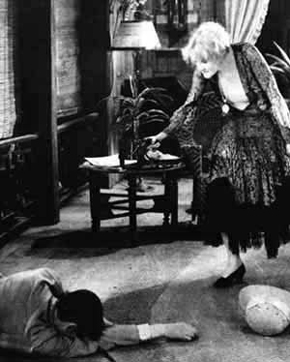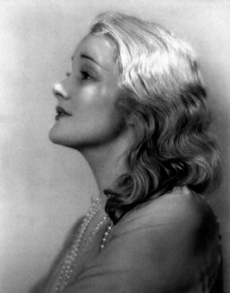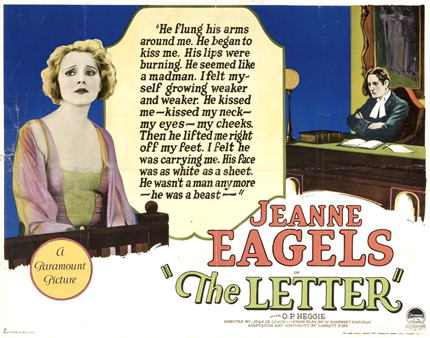
 |
|
|
|
The Warner Archive Collection has come up with a genuine rarity this time, a legendary performance by the famous actress Jeanne Eagels. Although her life was commemorated in a fictionalized 1957 biopic starring Kim Novak, Eagels is an almost forgotten name. Few if any of her silent films survive and she only made two or three talkies. The most famous is this 1929 Paramount version, directed by Frenchman Jean de Limur. When Warners bought the remake rights for the Bette Davis / William Wyler classic 1940 version, the Paramount silent was apparently part of the bargain. For roughly eighty years, Jeanne Eagels has remained unreachable by potential fans, another stage actress from an era that can be accessed only through old reviews and testimony from those who saw her perform. By resurrecting the 1929 early talkie The Letter from obscurity, the Warner Archive Collection can honestly claim to be doing much more than 'exploiting studio assets'. This is like finding a walking, talking record of a performance by Sarah Bernhardt. 
W. Somerset Maugham's 1927 play The Letter is a steamy tale of sex and deceit across the racial barrier in colonial British Malaya. Bored plantation manager's wife Leslie Crosbie (Ms. Eagels) has been stepping out on her husband Robert (Reginald Owen) for years with a handsome lover, Geoffrey Hammond (Herbert Marshall). But when Hammond throws her over for a "Chinese woman", Li-Ti (Lady Tsen Mei), Leslie empties her husband's pistol into him. She claims at the trial that Hammond tried to rape her, and it looks as if the problem will be cleared up quickly. Then On Chi Seng (Tamaki Yoshiwara), assistant to Leslie's defense attorney Howard Joyce (O.P.Heggie), brings bad news: Li-Ti has a letter that indicates that Leslie has perjured herself, and that proves her guilt. The vengeful Li-Ti demands that Leslie pay $10,000 for the letter, and to bring the money personally to the Chinese quarter of Singapore. Fans of Bette Davis will immediately notice the differences in this earlier, less racially sensitive reading of The Letter. Neither Li-Ti nor anybody else explains that the woman needn't bother trying to present the letter as evidence in open court; it's assumed that Li-Ti would be barred from the proceedings because of racial prejudice. Attorney Joyce's assistant Seng carefully maintains the required humility before his employer, all the while taking personal pleasure seeing the white hypocrites put on the spot. The smug white world spins out of control in the latter half of the show, as Leslie Crosbie is forced to bow before the contemptuous Li-Ti to retrieve her letter. Yet the movie confirms the Chinese as the "sexual savages" of white prejudices. Li-Ti keeps a number of beautiful Asian women in a cage in her private rooms; a prospective Chinese buyer or client (?) looks them over with a hungry grin, and then checks out Leslie for good measure. Li-Ti's revenge is racially based: she can't kill Leslie for murdering her lover, but she can make her squirm. 
The socially progressive William Wyler version is more sympathetic to the Chinese lover, who is allowed to be the wife of the shooting victim. Missouri-born Eagels affects an English accent to play the repressed / hysterical Leslie Crosbie, a woman who becomes the slave of her own "wild passions". The stage actress gives what is essentially an adapted stage performance, perhaps less cinematically nuanced than Davis's but certainly brimming with energy and emotion. Eagel's Leslie has given up on her fuddy-duddy of a hubby, who spends his evenings on his hobbies. On the crucial night of the murder, he bops into Singapore on some business about a rifle. Eagels shows a full range of feminine deceit. Leslie succumbs to her pride and anger, plays the perfect victim at the trial, endures the stress of admitting the truth to Joyce, and then walks alone into Li-Ti's house of sin to buy back her life. Her final outburst, a major monologue, is quite a shocker. This version of The Letter will seem less polished but also less constrained than the 1940 classic. It doesn't reach for the Wyler version's weird finish, with Leslie's almost supernatural Asian foe (Gale Sondergaard) exacting an exotic, cold-blooded revenge to please the Production Code. We instead end with Leslie's outburst to her shocked husband, her declaration of unrepentant erotic savagery. A straight stage adaptation, it is a bit stilted by later standards and lacks the mystery elements of the Bette Davis film. But we can see immediately why the powerhouse Ms. Eagels was such a big star, and why Bette Davis idolized her. And thanks to the WAC, a star is (re-) born. 
The movie is arranged in very few scenes, possibly following the outline of the stage play. Bette Davis fans will be amused by the fact that Herbert Marshall, the errant lover of this film, plays Leslie's cuckolded husband in the remake. Ms. Eagels was nominated as best actress for The Letter, but posthumously ... she died only six months after its release. The Warner Archive Collection DVD-R of The Letter is a very good encoding of this seldom-seen rarity. The disc begins with a disclaimer explaining that the transfer was made from the only known surviving 35mm print, and that audio is missing from the first reel. Excepting the spliced Paramount logo the film is in very good shape, showing only the expected light contrast flickering and surface flecks that a digital overhaul would easily rectify. I hope a hi-res scan has been socked away, in anticipation of a future where important vintage titles are restored and preserved on a more routine basis. 
The first minute or so of the picture is silent, but no dialogue is lost. The early-talkie soundscape is a bit odd throughout the film. Many connective scenes play in silence. In more than one scene, when characters step out-of-doors we see but do not hear musicians playing as they sit on the steps. I'm wary of early talkies without English subtitles, as voices can be hard to make out, All the dialogue in The Letter is clear and understandable. The movie makes for a very interesting viewing experience, and an essential one for students of American theater history.
On a scale of Excellent, Good, Fair, and Poor,
The Letter rates:
Reviews on the Savant main site have additional credits information and are often updated and annotated with reader input and graphics. Also, don't forget the 2010 Savant Wish List. T'was Ever Thus.
Review Staff | About DVD Talk | Newsletter Subscribe | Join DVD Talk Forum |
| ||||||||||||||||||